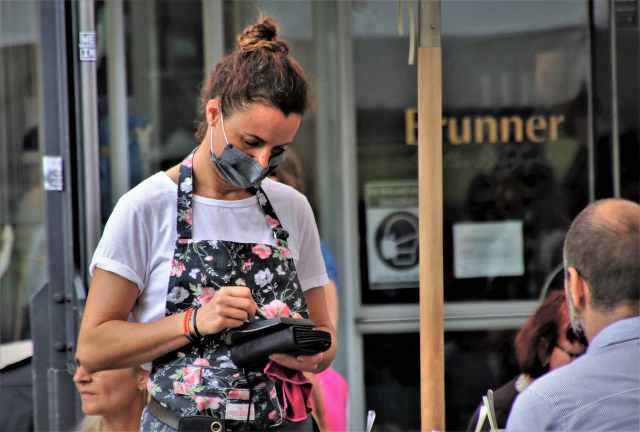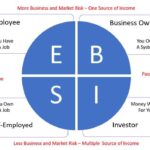With Washington DC again talking about raising the minimum wage it is high time that I refresh this post about how raising the minimum wage will have a minimal effect upon improving a person’s standard of living, hurt an already struggling economy, and really only benefit the tax collector.
I believe that everyone deserves to be paid for their contributions to the bottom line and not to be exploited. However, I often wonder about politicians pushing for a higher minimum wage. While it may seem like a good idea on the surface to give workers more disposable income, anyone with even the most basic understanding of economics would see the folly of raising the minimum wage, especially at the national level.
Minimum wage earners are mainly employed in the manual labor or services sectors, and generally, occupy jobs that nearly any able-bodied person can do. That is to say that the employee does not come with special skills or hard to obtain certifications. The worker can be trained by the owner, making the worker little more than a commodity with relatively no differentiation from another worker.
In 2019, 58% of minimum wage workers were age 24 or younger. Young people need entry-level jobs to start climbing the career ladders but raising the minimum wage would break the bottom steps.

If the business owner is forced to raise the entry-level pay for their workers, four outcomes are possible:
- The owner does not raise his prices and absorbs the additional payroll cost, resulting in a one for one reduction of his profit. This is an unlikely option if there is a large increase in the minimum wage as is currently proposed. Absorbing even some of the additional payroll cost means that the owner now has less disposable income, equal to the additional income received by his employees. This option increases the risk of business failure since lower profits reduce the value of the business. A reduced business value makes it harder to obtain credit and leaves the business at risk of failure with even a slight change in economic fortunes. This is the primary reason so many businesses with low-wage jobs were affected by COVID-19. Furthermore, the owner has less capital to invest in his business or to even maintain the assets he already owns.
- The owner is forced to raise his prices to cover the additional labor costs. Here, consumers have to pay more for the same service than they did before the wage increase went into effect. In the end, the additional income the worker receives is simply absorbed by higher prices when other businesses they frequent are forced to raise their prices too. Ultimately, the worker’s standard of living remains essentially unchanged.
- The owner will outsource as much back-office work as possible, such as accounting and marketing to offshore resources, to take advantage of their cheaper labor.
- The business owner will replace workers with automation. That process has already begun. Many fast-food restaurants have replaced human order takers with self-service kiosks and mobile ordering apps to reduce employee hours. Business Insider also reported that fry cooks are being replaced by robots as well. Service sector businesses are not the only ones replacing workers with automation due to increased labor costs. Firms like flooring giant Shaw Industries created a middle-class Sputnik moment when they pared down their workforce from 28,000 to 23,000 during the 2008 recession, by investing in robotics and mechanization.
Now, the law of unintended consequences kicks in because supporters of minimum wage increases fail to ask “And then, what will happen“.
The problem with a minimum wage hike is that it does not only affect the first rung of the career ladder. The worker that has learned some additional skills, making themself a little more valuable to the business owner and who has received one or more previous pay raises, is now being paid the same as a new entry-level employee. The owner is forced to raise the more experienced worker’s rate of pay too, to preserve the value differential that the more experienced worker has over the entry-level worker.
The increase of prices for the same product or service is known as inflation. With inflation, the money you earned yesterday does not have the same buying power today. Said another way, the value of any savings you put away yesterday has less buying power today, encouraging you to spend more money today and save less, since a dollar buys you more today and less tomorrow. However, on the flip side, inflation has an inverse relationship to existing debt, which is usually fixed. With higher income and the same debt payments, the debt-to-income ratio is lowered. This encourages you to buy more on credit today because lending institutions will have to raise their interest rates to provide the same return.
As of January 2021, minimum wages are set higher than the federal minimum wage in 29 states and dozens of cities and counties. These municipalities are raising the rate gradually to allow business owners to adjust their compensation plans. A large increase in the federal minimum wage causes a monumental pay scale shift throughout a business. There is no reason to think that federal politicians have better judgment than the state, county, and city politicians on this matter, so there is no basis for the federal government to override their choices.
Minimum wage mandates are a bad idea in general, and they are more harmful when imposed nationwide since they do not take into account regional variations of the cost of living, policy preferences, and economic structures.
Small businesses are overly affected by a minimum wage hike because they have more minimum wage workers. In 2019, the average wage in private sector establishments with fewer than 100 workers was $976 a week, compared to $1,914 a week for establishments with more than 1,000 workers.
Small businesses were also hit harder than large ones by the pandemic, and low‐wage employment was hit harder than high‐wage employment. A Bureau of Labor Statistics analysis found that “occupations with lower wages are more common in the shutdown sectors than elsewhere in the economy.” So, raising the federal minimum wages would disproportionally hurt occupations and businesses hardest hit by the pandemic.
A 2019 study by Sudheer Chava, Alexander Oettl, and Manpreet Singh examined how minimum wage laws affect small businesses. They used a large dataset of small business finances over the 1989 to 2013 period and studied variations in minimum wage rates. They found that:
Increases in the federal minimum wage worsen the financial health of small businesses in the affected states.
Increases in the minimum wage also lead to lower bank credits, higher loan defaults, lower employment, and lower entry and higher exit rates for small businesses.
Don’t be fooled by the real reason the federal government wants to raise the minimum wage. Higher wages, up and down the pay scale, mean that everyone will pay more federal and state income taxes as well as increased FICA contributions all of which are experiencing deficits as a result of the COVID-19 pandemic. After trillions of dollars in stimulus, the government sees raising the minimum wage as a way to boost revenue, reduce its national debt to the revenues collected by the federal government, and make it appear like they are doing something to close the wage gap.

Since so many low-wage employees work as laborers or in the recreation, hospitality, and retail sectors, which were the segments of the economy most affected by the pandemic, I think the real question the government needs to focus on is how to get them back to full-time employment. If you ask me, the answer is to promote more small business start-ups. That is the reason why start-up businesses are often cited as the economic engine of America.
Increasing the minimum wage will have little effect on a person’s standard of living up and down the income scale, will encourage people to spend more today, and will discourage saving. In the end, I can’t help but wonder who other than the government benefits from an increased minimum wage. The ensuing inflation means that the huge debt the government has racked up is essentially made a smaller proportion of total government income from tax collections and to the nation’s Gross Domestic Product (GDP). It also encourages people to spend more today, giving the GDP a short-term bump, while in the end, making workers more reliant on government assistance when they retire since they will have saved far less for retirement. The real winner is the government, the real losers are the workers.
What is your opinion regarding raising the minimum wage?












